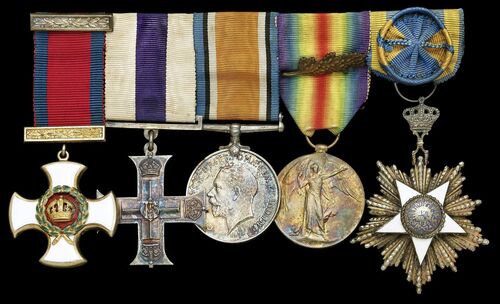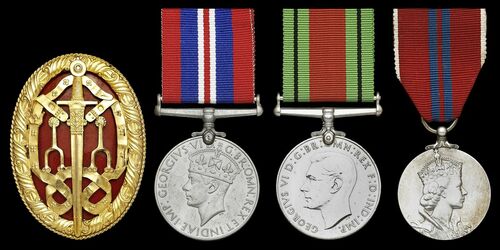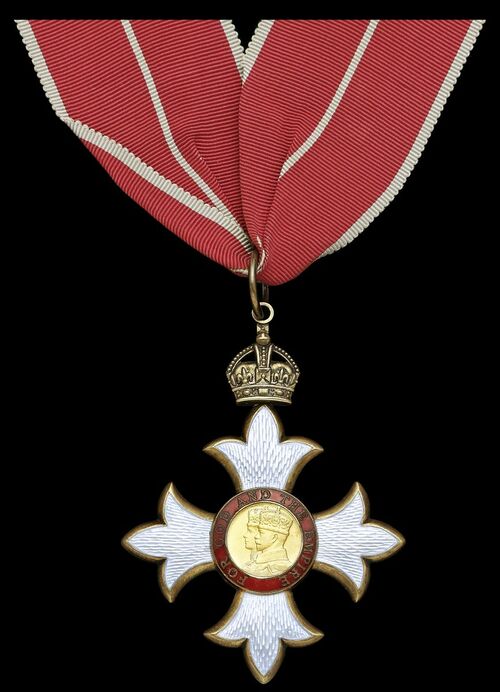Auction: 23003 - Orders, Decorations and Medals
Lot: 250
The 1956 Knight Bachelor, Second World War C.B.E., Great War D.S.O. and M.C. group of ten awarded to Brigadier Sir A. H. Killick, South Lancashire Regiment, late Machine Gun Corps
Knight Bachelor's Badge, 2nd Type breast Badge, silver-gilt and enamel, hallmarks for London 1956; The Most Excellent Order of the British Empire, Military Division (C.B.E.) 2nd Type, Commander's neck Badge, silver-gilt and enamel; Distinguished Service Order, G.V.R., silver-gilt and enamel; Military Cross, G.V.R.; British War and Victory Medals, with M.I.D. oakleaves (Major A. H. Killick); Defence and War Medals 1939-45; Coronation 1953; Egypt, Kingdom, Order of the Nile, Officer's breast Badge, silver-gilt and enamel, by Lattes, the Great War issues mounted as worn, the others loose good very fine or better (10)
Knight Bachelor London Gazette 2 January 1956, when listed as Brigadier Alexander Herbert Killick, C.B.E., D.S.O., M.C., Secretary, Royal Institute of Chartered Surveyors.
C.B.E. London Gazette 1 January 1944.
D.S.O. London Gazette 3 June 1919.
M.C. London Gazette 3 June 1918.
M.I.D. London Gazette 22 January 1919; 5 June 1919.
Egypt, Order of the Nile, Fourth Class London Gazette 19 January 1920.
Alexander Hebert Killick was born at Rochester, Kent, on 10 February 1894 and was educated at Dulwich College, where he was in both the rugby XV and cricket XI, and at Exeter College, Oxford. A member of the University’s Officer Training Corps, he was commissioned Second Lieutenant into the Infantry on 8 October 1914. Posted initially to the 10th Service Battalion, East Surrey Regiment on 6 December 1914, he transferred to the South Lancashire Regiment on 8 July 1915, and saw service out on the Western Front from 9 February 1916, attached to the Machine Gun Corps. Present out there at the time of the Battle of the Somme, he was promoted to temporary Lieutenant on 2 July 1916, and was then made an acting Captain on 30 August 1916, whilst serving as second-in-command of a machine gun company.
Killick was confirmed in his promotion to the rank of Lieutenant on 1 July 1917 and was promoted acting Major on 19 April 1918, whilst second in command of the 10th Machine Gun Battalion, a unit of the 10th Irish Division which was then on service in Egypt and Palestine. The 10th Division had moved from Salonica to Egypt in September 1917 and fought in the Third Battle of Gaza in November 1917, and then saw further operations in Palestine through to the end of the war with Turkey on 31 October 1918.
For his services with the 10th Machine Gun Battalion in Palestine, latterly as acting Lieutenant Colonel in command of the battalion, he was twice Mentioned in Despatches (London Gazettes 22 January 1919 and 5 June 1919 refer), and was awarded both the Military Cross and the Distinguished Service Order, the latter a particularly rare award considering that he was still only a substantive Lieutenant.
Relinquishing his acting ranks, Killick was appointed a general staff officer 3rd grade on 6 June 1919, and continued to see active service in the Middle East, transferring to the East Yorkshire Regiment on 21 December 1919. He saw further service in the Black Sea region during the Allied Intervention in the Russian Civil War, and also in Turkey, and for his services was awarded the Egyptian Order of the Nile 4th Class. Returning home, he was promoted Captain on 28 May 1921, and appointed a Brigade Major on 2 September 1921, subsequently being appointed adjutant of the Birmingham and Bristol University Officer Training Corps. He was next appointed a general staff officer 3rd grade with the War Office on 4 February 1929, being seconded for this service from the East Yorkshire Regiment to the staff, and was promoted to brevet Major on 1 October 1930. He transferred to the Regular Army Reserve of Officers in the rank of Major on 8 October 1932.
Following the outbreak of the Second World War, Killick was brought out of retirement, and held the rank of Major and war substantive Lieutenant-Colonel and temporary Colonel with the East Yorkshire Regiment. He served as the Military Secretary to the Army Council, and was appointed a Commander of the Order of the British Empire in the 1944 New Year’s Honours’ List. Having exceeded the age limit, he ceased to belong to the Reserve of Officers on 18 November 1945, and was granted the honorary rank of Brigadier.
Having fully retired from the army, Killick continued in his work as the Secretary of the Royal Institute of Chartered Surveyors, an appointment he had first taken up in 1932, through to his retirement in 1959, and for his services with the R.I.C.S. was knighted in 1956, receiving the accolade from H.M. Queen Elizabeth the Queen Mother at Buckingham Palace on 7 February 1956.
He latterly lived in Birchington, Kent, and died on 4 February 1975.
Subject to 20% VAT on Buyer’s Premium. For more information please view Terms and Conditions for Buyers.
Sold for
£2,800
Starting price
£2400









